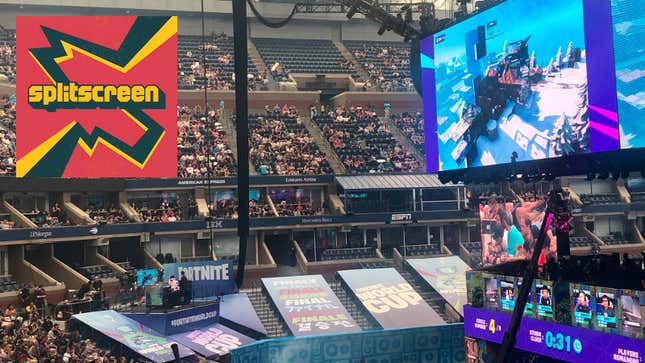
The Fortnite World Cup was packed with young faces, both attendees and competitors. Unlike many other esport events, this one had a kid-friendly, earnest vibe that dovetailed well with the chaotic playground atmosphere of Fortnite. Kotaku editor-at-large Riley MacLeod came on Kotaku Splitscreen this week to talk about his coverage of the Fortnite World Cup and the game’s competitive scene.
First up, Kirk and I discuss the news from last weekend, citing Joshua Rivera’s editorial “We Do Not Need To Defend Video Games From Politicians,” my own coverage of the ESA leaking thousands of journalists’ personal information, and Kotaku’s coverage of Evo 2019. After that, we discussed the games we’re playing, with me on Phoenix Wright and Kirk starting up Fire Emblem: Three Houses. We then brought Riley on (27:08) to chat about Fortnite. Lastly, we got into off-topic discussion (1:01:10) about Schitt’s Creek, Kim Stanley Robinson’s Mars trilogy, and Kirk’s feel-good music pick of the week.
Get the MP3 here, or read an excerpt below.
Kirk: I haven’t played Fortnite in a while. What is the dominant strategy? What do the dominant players do? How do they kill the other players, for lack of a more artful way of putting it?
Riley: I think one of the hardest things about Fortnite, and one of the most contentious things, is that they’re always adding stuff and taking stuff away, and so the strategies change. When they had the Baller—the hamster ball vehicle—that suddenly because this huge late-game strategy of bringing it with you into the end. When they changed the Siphon mechanic—so, in competitive, when you kill someone, you get materials and health back, but in the regular version, you don’t. And that becomes a strategy. It’s just always massively changing, and I feel like there isn’t really—as far as I can tell, and I’m sure people who play it more will fight me—the strategy just seems to be, figure out what the hell is going on. You have to be good at building. High ground seems to be pretty standard.
Kirk: Right. There’s a basic level of twitch skills and just being able to shoot people with a mouse and keyboard that all of these players probably have, and then the strategies themselves are just changing so quickly, it sounds like, that there’s no set thing. That’s kind of cool, right? If it it’s changing so fast, it keeps it really playful and chaotic. It isn’t just, a meta metastasizes and everybody just does that thing forever until they get sick of it.
Riley: I really like that, but I can also see how for a competitive scene, it makes things really complicated. Things are always changing, and strategies are just appearing, and weapons are getting stronger or weaker or vanishing or coming. It creates a lot of upheaval in the competitive scene. I think it’s cool, but I’m not a super competitive player, and I think if you’re good, you can learn to be good with anything, I guess.
Kirk: Maddy, from the esports you’ve covered, I’m guessing that’s not the norm?
Maddy: It’s not the norm. But I also think it’s part of what has made Fortnite work so well in its own specific niche, where a lot of the people who play it are just entertainers, essentially. Maybe they’re also very good at the game, but because the game changes so often, that lends itself very well to a constant Twitch schedule, for example. If the game is constantly changing, your viewers will never really get bored by it the way that they might if somebody is just mainlining Counter-Strike matches where the meta’s been pretty well figured out, at this point.
Kirk: It’s interesting to imagine Fortnite as a game that was designed for streaming.
Riley: This came up before the World Cup—they banned stretched resolutions, which is something that some players were using to see better. In the blog about why they banned it, part of it was that it doesn’t look good. Which I found to be really interesting.
Kirk: Just like, “aesthetically, this sucks.” [Laughs.]
Riley: Like, it doesn’t look good for streaming. At least they’re being honest?
Kirk: Yeah, like everybody’s playing with pixels that are the size of their screen and they’re killing everybody really fast, but it looks awful, and no one wants to watch it? Epic is like, “This is not what we’re about.”
For much more, listen to the entire episode. As always, you can subscribe to us on Apple Podcasts and Google Play to get every episode as it happens. Leave us a review if you like what you hear, and reach us at splitscreen@kotaku.com with any and all questions, requests, and suggestions.